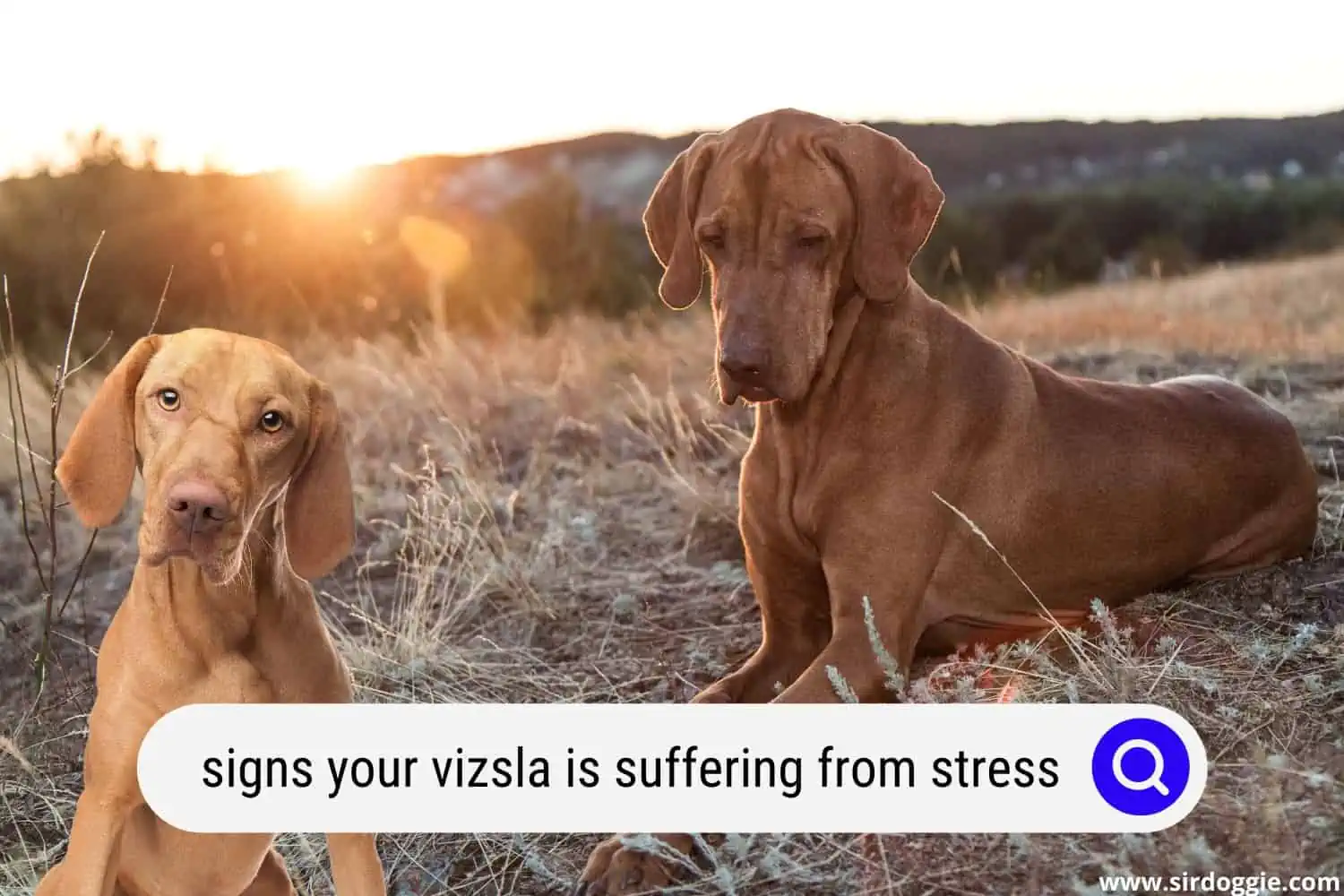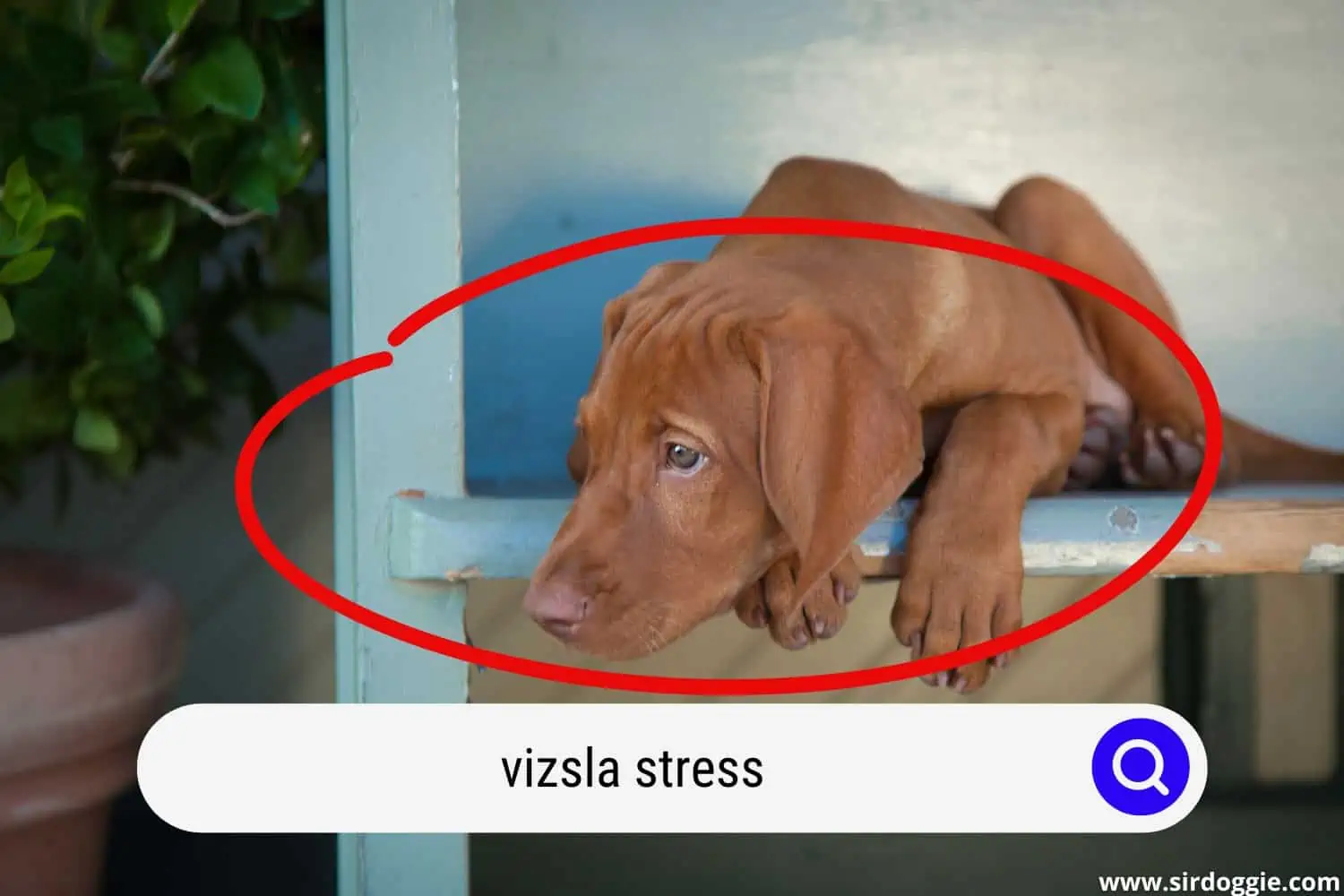7 Signs Your Vizsla is Suffering from Stress (What to Look For)
Having a pet is a great responsibility, especially if it is a dog. One of the most beloved dog breeds by people is the Vizslas. These canines have their own physical and emotional features, so we must treat them properly.

When we have a dog, we must try to provide the best possible care to prevent its health from being affected. Good health is not only crucial in humans but also in animals since, in the end, they are also living beings.
Just like humans, dogs also get stressed, and you can notice that when your Vizsla begins to show unusual behavior. It is vital that we see when our pet is stressed as they cannot tell us in words. Therefore, we have to learn to read their body language to get an idea of what is happening.
There are several signs of stress that can give us a clue to determine if our Viszla is stressed or not:
Signs of Stress in a Vizsla
Body Language
This sign is one of the easiest to identify. When our Vizsla is stressed, it begins to make various gestures to inform us about its situation. One of the most common is when they show the whites of their eyes (known as whale eye). It is a clear indication that our dog may be stressed.
In the same way, our pet can perform other body gestures such as folding its tail, yawning, licking itself, turning its eyes, or positioning its ears back. Panting is also another gesture that can make you think that your Vizsla may be stressed.
Hyperactivity
Hyperactivity is something that many breeds of dog present, especially the Vizslas. However, that does not mean it is always normal.
Although a Vizsla is active in many situations, there are chances that its constant hyperactivity is a sign of stress. It occurs mostly when your pet’s hyperactivity level exceeds normal. Its inability to stay calm can give you a clue that something is wrong.
This situation can lead them to be very destructive with different elements in your house such as furniture, walls, doors, or any utensil they find in their path. They do this to release all the tension they have accumulated.
Excessive Growling
When a dog growls, it certainly means that something is bothering it. Either a person or another animal may be causing your Vizsla some discomfort. During stress, many dogs feel threatened when someone invades their space. At other times, they may growl to make their owners see that they are in pain.
In these situations, the Vizslas do not pretend to be aggressive since, as we know, this breed does not present this type of behavior. During these moments, you should be quite understanding with your pet and find out what is going on. Apply some techniques that give your Vizsla confidence and make it feel more comfortable.
Deconcentration
Many times, it is difficult for humans to know what their pet feels quickly. Sometimes we do not even find out on time. It must be terrible for our Vizsla to try to express something when it is suffering because it cannot speak our language.
This situation, along with stress, leads to a state of apathy and inattention. On many occasions, the nervousness that our canine can feel prevents it from concentrating and following our orders.
Therefore, we must know the most common signs of stress in a dog since a lack of concentration does not always mean that our pet is stressed. That may simply be because our Vizsla is sick or not feeling well.
When your dog shows an attention deficit, the best thing you can do is take it to the vet for a checkup.
Behavioral Changes
No one knows our dogs better than we do. If we have a Vizsla for a long time, it is very likely that we see every aspect and stage of its behavior. It is like when we meet a person with a specific personality.
Stress can lead our dogs to have unusual behaviors in them. During this situation, it is easier to identify if your dog is stressed or not. The personality of a Vizsla is quite identifiable, so a slight change in behavior can be easily noticed.
If your Vizsla begins to engage in behavior that you have never seen before, then it is likely that your dog is experiencing stress. You can notice that in the moments when your pet is sad or depressed. It is easy to detect if it is actually a happy and active dog.
Incessant Barking
Vizslas are not animals known to bark continually or over the top. Instead, they are quite friendly animals that socialize both with members of their human family and with strangers and other animals.
So when your Vizsla starts barking repeatedly, it is a sign that it is trying to tell you that it doesn’t feel right. Similarly, stress can make your canine complain a lot. Complaining is an automatic way for them to respond to their own discomfort.
Our Vizslas cannot control their barking and complaints when they are stressed, so it is necessary to help them in those circumstances. A safe way would be to take it to a vet for an examination.
Rigid Musculature
Stress can cause your Vizsla to freeze or tighten its muscles when it sees something that makes you feel uncomfortable or scared. In these circumstances, your dog may find itself in a situation of maximum tension in which both its muscles and its tail remain stiff.
When a canine is very tense, it can be dangerous for both it and us. It means that your dog is too stressed and that at any time, you or a member of your family may receive a warning or in the worst case, a bite. Unfortunately, our pet cannot handle this situation.

Summary
You should always ensure the physical and emotional health of your Vizsla. They are quite loving pets that can be easily affected by an uncomfortable or stressful situation. Try to visualize each of the signs when you notice that your dog behaves differently than it usually does. Possibly, it is necessary to take it to a specialist to make sure that your dog is well.

Family Dog Expert Author
Hi there! I’m Stuart, a devoted dog lover and family dog expert with over a decade of experience working with our furry companions. My passion for dogs drives me to share my knowledge and expertise, helping families build strong, loving bonds with their four-legged friends. When I’m not writing for SirDoggie, you’ll find me hiking, playing with my beautiful dog, or studying music.